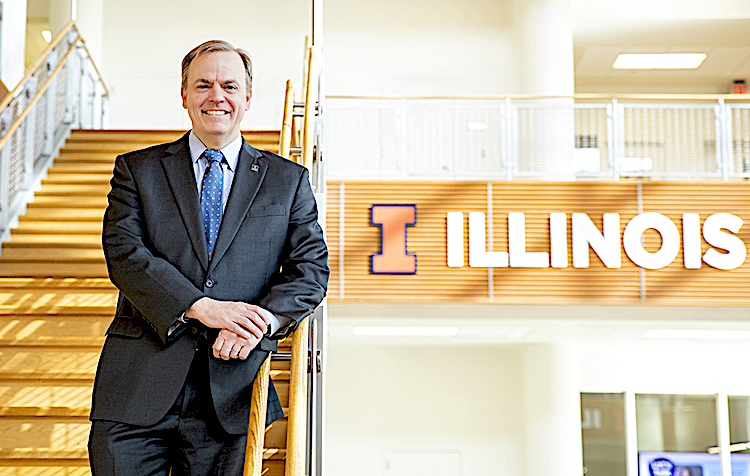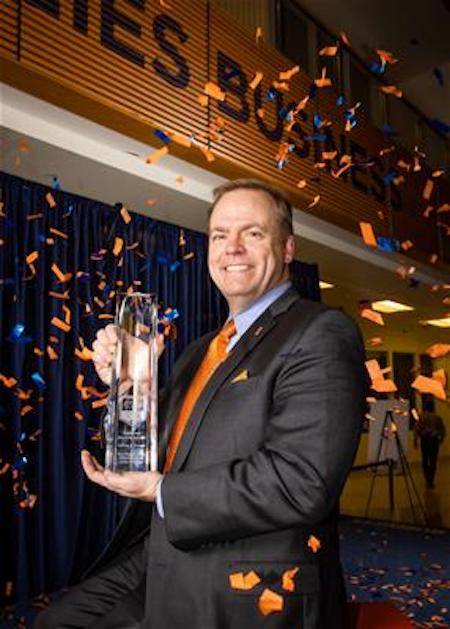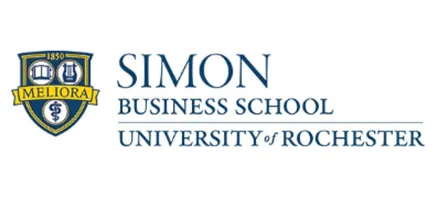
Gies College of Business Dean Jeffrey R. Brown
Even before his last official day as dean of the Gies College of Business, Jeffrey Brown will be canoeing down the Noatak River in the Alaskan wilderness. For one of the few times in the nine years since he took over the deanship of the University of Illinois’ business school in 2015, no one will be able to reach him via cell phone. There is no cell service in the Gates of the Arctic National Park which can only be reached by floatplane.
Brown, 56, will take this well-deserved vacation after accomplishing what few higher education leaders can claim: an astonishing transformation of an important institution of higher learning. His reinvention of the Gies College of Business into a world leader in digital education will be studied for decades. When he departs the dean’s office for the last time on July 29th–18 days before his last official day on Aug. 15–Brown says he will likely leave a bit wistful but with a true sense of achievement. “It feels bittersweet and I still don’t know that I will ever find another job that will be as awarding and fulfilling as this one,” he confides in an interview with Poets&Quants.
As Sinatra once famously sang, “Regrets? Too Few To Mention,” Brown says he bears no remorse or contrition about the educational revolution he created. “I’m not really a regrets guy,” Brown says. “I don’t spend a lot of time thinking that I wish I did things differently. If you are happy where you are and I am, you wouldn’t want to go back and change things.”
NO BUSINESS SCHOOL IN THE WORLD HAS CHANGED AS MUCH AS GIES IN THE PAST DECADE

Gies Dean Jeff Brown receiving the Dean of the Year award
And why should he? No business school in the world has changed as much as Gies in the past decade. Brown leaves behind an extraordinary record of achievement in one of the most successful deanships of his generation. Named Dean of the Year by Poets&Quants in 2021, he raised more than $350 million, bringing in the largest single gift in the history of the University of Illinois – a $150 million naming gift from alumnus Larry Gies and his wife, Beth, 2017. In late 2022, Brown also hauled in a $25 million pledge to help finance a new academic building from Steven Wymer, a Gies alum and the long-time investment portfolio manager at Fidelity.
He hired more than 60 new faculty, a more than 40% increase, doubled the number of enrolled students, revamped the undergraduate and graduate curriculums at the school, launched a highly successful branding campaign to give the school national and international prominence, and broke ground on a new building that will ultimately allow Gies to increase enrollment in its popular undergraduate business program.
No less important, however, Brown courageously closed down five programs, including a residential full-time MBA and an Executive MBA program, to focus more squarely on the online market. In doing so, he made good on his promise to democratize education, aggressively building out the online iMBA program at a disruptively priced $24,000 that became the fastest-growing MBA in the world. It also won recognition from Poets&Quants as the MBA Program of the Year in 2022. From a standing start in 2016 with an initial cohort of 263 students, iMBA enrollment exploded to nearly 4,200 students from every state and all over the world. Today, more than 5,000 graduate students are enrolled in the three online degree programs at Gies.
‘WELL-INFORMED RISKS THAT TURNED OUT WELL’
To achieve that unprecedented growth, Brown smartly navigated all the inevitable bureaucratic hurdles that the dean of any school would face, along with a two-year-long state budget stalemate and the pandemic. He also had to rapidly build an infrastructure to handle the ballooning enrollments. Among other things, Gies faculty now do 45 live Internet classes a week, nine a day. More than 3.3 million learners have accessed its MOOC courses on Coursera, and over 12,500 learners are students or alumni of Gies online programs. In Brown’s last year in the job, the college has launched 14 credit-bearing certificates, from value chain management to strategic leadership and management, all stackable into the college’s online degree programs along with more than 40 online courses. It is yet another innovation that Brown believes represents the future of higher education. Like the disruptively priced online degrees, most of the 12-credit-hour certificates are also inexpensively priced at $3,984 each.
To get all that done required not merely a vision for the future of education; it required the courage and the skills of a master politician. If he has regrets, it is in the service of making a transformation possible. “I don’t have any big ones,” he says of regrets. “I have smaller ones from the errant comment I should not have made to someone or the way I handled an internal something on campus. Most of the big bets we made paid off. They were well-informed risks, and they turned out well.
“There are some times when in a big complex bureaucratic organization there are parts resistant to change. It’s not my first choice but I am willing to don my battle gear and go into battle. When I do that, I often feel bad after the fact if someone felt bruised and battered. But if someone is going to overstep their bounds and tell me what I can’t do, I am going to do the best for the institution. There was a fair amount of that. I had a lot of unhappy young alums when I closed down the MBA program. They were upset because we ended something that was of value to them. That was still hard.”
‘NOT A QUESTION OF SHOULD WE DO IT. IT IS A QUESTION OF HOW TO DO IT’
Nevertheless, Brown believes his successor will have plenty to do. “We are rethinking our corporate affiliates program and thinking about how to organize ourselves on entrepreneurship education. There are things like that that didn’t quite get over the hurdle. but I am also leaving things that allow the new dean to have some quick wins right out of the gate, including the opening of Wymer Hall (next year) and more things in the online space. My successor will be able to put their imprint on it. I have been very conscious about leaving at a time when there is exciting new stuff coming down the pipe. You want alumni and students to see that the college is in great shape moving forward.”
What is Brown most proud of during his nine years as dean? “I don’t know if I will be remembered but this era will be remembered for three things: the big shift in digital learning and the naming of the college and the new building. Those things will have long lasting impact. The fourth thing which I hope will last a long time is the shift in the culture. We made the school a much more innovative place and that will require more leadership and more nurturing of that environment.”
Ultimately, leveraging technology to make higher education more accessible and affordable has and will continue to have impact far beyond the University of Illinois’ campus. Unquestionably, believes Brown, it is the future of education. “I still am of the belief that this is going to be a huge part of the future of higher education,” he says. “It will never replace or should it replace in-person education. You can tell the same great story on stage or through a Hollywood movie or a well-written book but they are all different mediums of sharing that same story. I feel the same way about education. You can deliver learning in person in a smaller setting or a larger classroom or online and each has its advantages. The future is a mix of all of the above. What we have done is to have an impact at scale. And there are millions of people out there who can benefit from higher education. We may not have figured it all out but we have made a big step toward that vision.
SURPRISED MORE SCHOOLS HAVEN’T EMBRACED LOW-COST, DIGITAL EDUCATION
“It’s very consistent with our mission and who we are,” notes Brown of his university’s land-grant mission and its historical commitment to the democratization of higher education. “When you get scale, it’s an upward spiral and you can make it more affordable, and if you make it more affordable you can scale. When you look at most of the institutions that haven’t been able to figure it out, it’s not because the demand isn’t there. They can’t get out of their own way. And in some cases, there are good reasons for it. The resistance can sometimes be for good reasons. And there may be fields like dance or other areas in the arts that would be difficult to fully create an experience online. But there are tens of millions of people in India alone who would benefit from this and I hope we can figure it out as a university and an industry. If you take the long view, higher education has been the purview of a very small slice of the world population. Even today, it is still a minority of the U.S. population has a college degree and we are the richest country in the world. Yet we have the technology to do this. It is not a question of whether we should do it. It is a question of how to do it?”
Making learning part of one’s lifetime journey has also informed Brown’s commitment to stackable credentials in the form of both for-credit courses and certificates. “I still think that this idea that you have to go to one institution for your whole education is antiquated as well,” he insists. “A lot will be driven by employers. I still believe the degree is useful but it should not be the only thing we should provide. We have been chipping away at it one little hammer blow at a time and a lot of universities have’t been able to do it because of course scheduling, software or bureaucratic reasons. I have been in meetings before when we were told we couldn’t do something because of the software. No, we are going to find a workaround. We just never have taken that as an answer.”
The next dean might well use artificial intelligence to more greatly expand access. “We are now piloting technology to use digital twins as faculty to teach classes,” explains Brown, citing the example of a Gies professor who recently used an avatar to teach some classes in an emerging technology course. “We will make sure the faculty approves it all, but if you start to think about what opportunities that opens up, it is enormous. The technology for translating in other languages has gotten so good that we can convert our lectures and conversations to any language in the world.”
‘I WILL FIND OTHER WAYS TO PUSH AND NUDGE’
If anything, Brown is surprised that more universities and schools didn’t more fully move toward the digital future with disruptive pricing. “I had thought that within three years there would be several players at our price point,” he says. “Three years later, we had one–Boston University–and since then there haven’t been any other. Other business schools have gotten in and provided high-quality online programs but not at a price point that provides real value to students. I am obviously biased but when I look around at the online MBA market, I can maybe understand why someone would choose an in-person marque brand name over us. But what I don’t understand is why anyone is getting an MBA at scores of schools that are charging a multiple of what we charge at a school that is not as good as ours. Regional familiarity with a brand is one reason. But it surprises me that schools are charging $60 to $80 grand for an online degree that is not special and they are getting students.”
Soon enough, though, Brown will indulge his love to the outdoors. As he told University Provost John Coleman, “Even if you want to reach me you will not be able to.” Brown will fly to Fairbanks, Alaska, for his canoeing adventure down the Noatak where he will paddle about 15 miles each day before setting up camp along the river’s banks. Brown will then make the bush flight to the Great Kobuk Sand Dunes, a barren landscape that is the largest active sand dunes within arctic latitudes. All told, he will visit five national parks in Alaska and then fly to Seattle to rent a camper van, spending a couple of weeks on the road in Washington state before finally returning to Urbana in September for the formal installation of his still-to-be-named successor.
As he sheds his identity as the dean of the Gies College of Business, Brown says he will most likely “miss having a real-life, impactful laboratory in which to take these ideas and implement them. That is the stuff that gets my juices flowing. If I return to the faculty, I will still have a chance to do it. But there’s a possibility that I am too interested in this topic to let it go. One way or another I will find other ways to push and nudge.”
Have no doubt about that.
DON’T MISS: DEAN OF THE YEAR GIES JEFFREY BROWN or POETS&QUANTS MBA OF THE YEAR IN 2022: GIES’ IMBA PROGRAM









